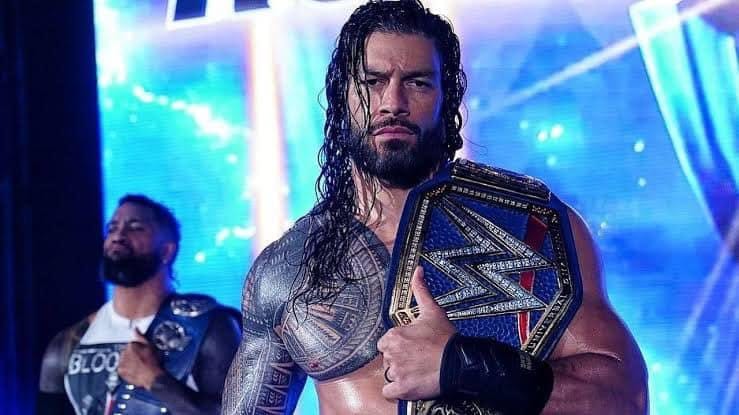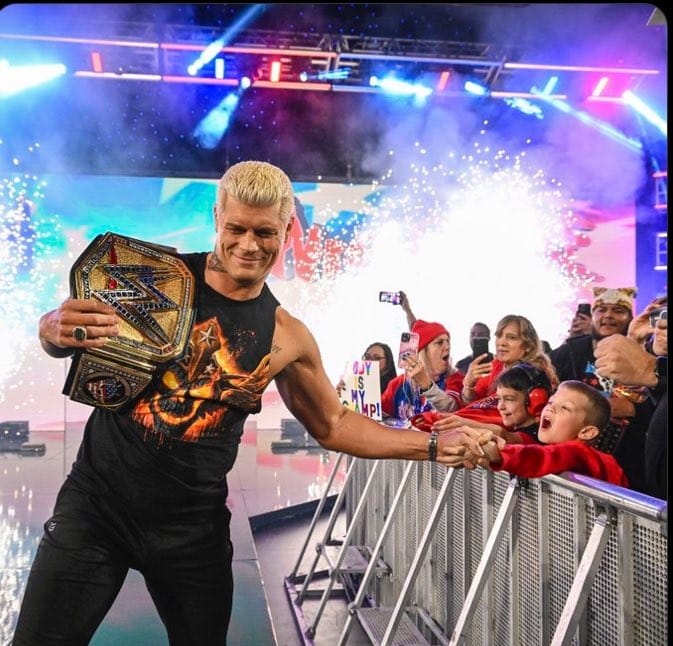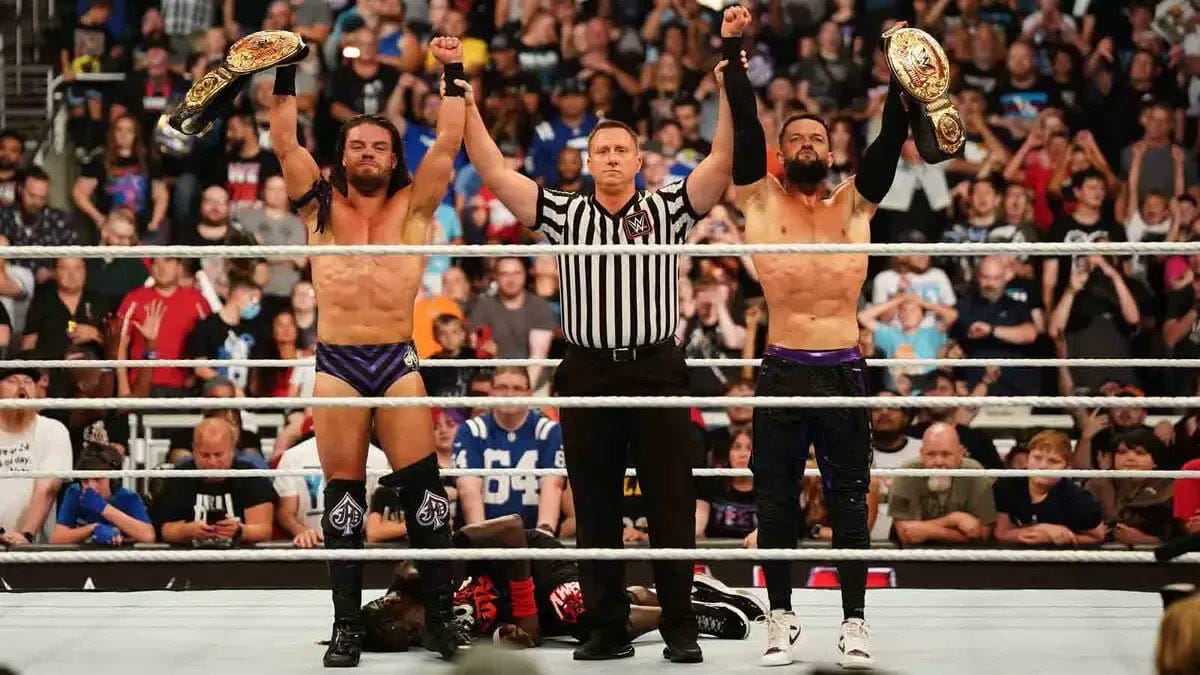For months, fans and critics alike have dissected WWE’s booking decisions, especially when it comes to champions and title defenses. Roman Reigns, as the Undisputed WWE Universal Champion, has often been a lightning rod for criticism due to his perceived infrequent title defenses. However, when comparing Roman’s championship reign to others across WWE, a clear double standard emerges.
Take Finn Bálor and JD McDonagh, for instance. Since winning the Undisputed WWE Tag Team Championships, they’ve only defended the titles once in over 150 days. While the duo has remained visible in Judgment Day storylines, their lack of defenses has largely gone unnoticed by critics. Despite holding titles that traditionally require active competition, the silence surrounding their reign contrasts sharply with the vocal criticism Roman faced during similar stretches.
Then there’s Cody Rhodes, one of WWE’s most celebrated stars. Cody’s title reign with the World Tag Team Championship alongside Jey Uso began with fanfare but has quickly lost steam in terms of action. Cody’s last defense of the titles came against Solo Sikoa and Jimmy Uso back in September—a span of two months without stepping into the ring to defend the belts. Yet, Cody, a wrestler often praised for his work ethic and dedication, has not faced the same scrutiny Roman endured.
And let’s not forget Logan Paul, who brought mainstream attention to WWE by holding the United States Championship. Logan’s reign had plenty of hype and excitement, particularly given his celebrity status. Yet, in over 200 days as champion, Logan defended the title only twice before ultimately losing it to LA Knight. Despite this, the criticism toward Logan’s reign has been minimal, with many focusing on his star power rather than his lack of activity as champion.
All of this begs the question: Why is Roman Reigns held to a different standard?
Roman’s reign as Universal Champion has undeniably changed the landscape of WWE. Since capturing the title in August 2020, Roman has brought prestige and gravitas to the belt, treating it as the pinnacle of professional wrestling. His character work, promo ability, and storytelling have drawn massive attention, keeping fans invested in his every move. However, Roman’s selective schedule and fewer title defenses have been a consistent target for detractors, who argue that a champion should be more active in the ring.
The reality, though, is that Roman’s reign was designed to feel special. WWE leaned into the idea that the Universal Championship was not just another title but a prize so significant that it required extraordinary effort to even earn a shot. Roman’s dominance elevated the championship, making every match he participated in feel like a monumental event. His defenses weren’t frequent, but they were always meaningful, ensuring that his appearances carried weight.
In contrast, other champions have been given far more leniency regarding their schedules and activity. Finn and JD’s lack of defenses, for example, has been largely ignored, even though tag team titles traditionally demand regular competition. Cody’s absence from title defenses since September hasn’t sparked outrage, despite his stature as one of WWE’s top babyfaces. And Logan’s minimal defenses during his US Title reign haven’t drawn widespread backlash, even with the belt being one of WWE’s cornerstone championships.
So why does Roman continue to be the focal point of criticism?
One possible explanation lies in Roman’s unparalleled dominance. As the face of WWE and leader of The Bloodline, Roman’s success has naturally placed him under a brighter spotlight. Fans expect more from him because he’s positioned as the company’s top star, and any perceived shortcomings are magnified. His part-time schedule, a byproduct of his star status, becomes an easy target for critics, even if his reign continues to deliver compelling storylines and historic moments.
Another factor could be the inherent bias toward babyface champions. Cody and Logan, as fan favorites, often receive the benefit of the doubt despite their own lapses in defending titles. Roman, on the other hand, thrives as a heel champion, and his character’s arrogance and refusal to defend the title regularly play into his detractors’ frustrations. This dynamic creates an uneven playing field, where Roman is judged more harshly than his counterparts.
It’s also worth noting that Roman’s booking represents a departure from WWE’s traditional approach to championship reigns. For years, titles were defended frequently, with champions wrestling on weekly television and monthly pay-per-views. Roman’s reign disrupted this formula, emphasizing long-term storytelling over quantity. This shift has been polarizing, with some fans appreciating the fresh approach and others longing for the days of more active champions.
But here’s the kicker: Roman’s approach works.
Despite the criticism, Roman’s reign remains one of the most successful in WWE history. His storylines consistently dominate headlines, and his matches are often the most anticipated on any card. The Bloodline saga, centered around Roman’s dominance, has been a ratings draw and critical success, proving that his infrequent defenses don’t diminish his impact as champion.
Meanwhile, the lack of criticism toward other champions’ inactivity reveals an inconsistency in how fans and critics evaluate title reigns. If the expectation is that a champion must defend their title frequently to be credible, then that standard should apply across the board. Finn, JD, Cody, and Logan have all had similarly inactive reigns, yet they’ve escaped the intense scrutiny that Roman endures.
Ultimately, this double standard underscores the unique position Roman holds in WWE. As the company’s top star, he’s held to higher expectations than his peers, even when their reigns are equally or more inactive. While it’s fair to critique booking decisions and champion activity, the selective outrage directed at Roman suggests that some of the criticism may be less about the frequency of defenses and more about the man holding the title.
Roman’s reign may not fit the traditional mold of a fighting champion, but that’s precisely what makes it so compelling. By treating the Universal Championship as a rare prize, Roman has elevated its importance and cemented his legacy as one of WWE’s all-time greats. As fans, we should appreciate the diversity in how champions are presented, recognizing that not every reign needs to follow the same formula to be successful.
In the end, the focus shouldn’t be on how often a champion defends their title but on the quality of their reign. Roman Reigns has consistently delivered high-quality matches, unforgettable moments, and captivating storytelling throughout his historic run. If anything, his reign has set a new benchmark for what a world champion can be—a figure who transcends wrestling and becomes a cultural phenomenon.
So before we criticize Roman for his perceived inactivity, perhaps it’s time to examine why similar standards aren’t applied to other champions. Finn, JD, Cody, and Logan have all had their own successes, but their lack of defenses hasn’t sparked the same level of outrage. This inconsistency highlights the need to reevaluate how we judge champions and their legacies.
Roman Reigns may not defend his title every week, but his impact on WWE is undeniable. His reign has redefined what it means to be a champion, proving that sometimes, less truly is more.



